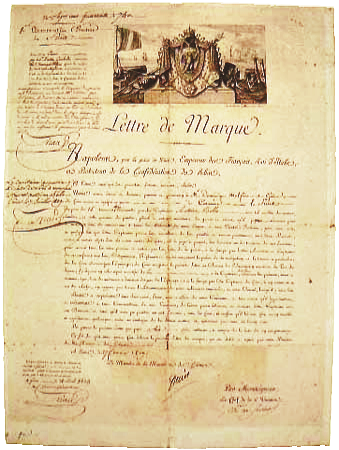First off, this post is not an endorsement of Ron Paul, and I purposely try to keep it apolitical here. My goal with this post was to present the ideas of the Letter of Marque, and it’s possible use in the wars dealing with drugs or terrorism. This is a tool of government, that has been used for a long time in the history of this world. It’s only in modern times that we have drifted away from these tools. In some cases, countries have made the Letter of Marque illegal, and that is too bad. But with Mexico and the US, it is still on the books and we purposely did not sign the Declaration of Paris because we wanted to retain our right to use privateers. Interesting stuff I thought, and applying this old tool to today’s problems is to me, building a steam powered snowmobile. lol And also to clarify, I am applying the concept of privateering and the Letter of Marque to land operations, as well as sea.
I also found out that the last time the US used privateers was at the beginning of World War II. The United States Navy issued a Letter of Marque to the Airship Resolute on the West Coast of the United States making it the first time the US Navy commissioned a privateer since the War of 1812. So privateers is not necessarily that old of an idea in the history of the US. Throughout the world, it is especially an old idea. Of course I have also pointed out the use of privateers during my country’s young history, and how important they were, and in this post I wanted to bring the idea up again for today’s problems.
Imagine if you would, if we issued Letters of Marque to PMC’s, with the express interest in destroying the enemies of the state and allow those PMC’s to profit from that action. That means if there is a Drug Cartel or Terrorist(s) out there that we want dead or even captured, we issue out these letters and lay out the specific terms of what that PMC could get out of the deal. Let’s say for a Drug Cartel, that PMC could capture Drug Cartel members and their property, a Prize Court could determine if they were lawfully captured and how much the PMC could take (based on the Letter of Marque), and then issue the award. That means the PMC could sell the planes, the mansions, the cars, or divvy up any cash. As for the capture of drugs, the Letter could also state exactly what is to be done with that stuff, in order for a PMC to retain the award. The draft of the Letter of Marque is extremely important, but not impossible to make. Best of all, the Letter of Marque is backed up by the US Constitution.
How about all of these bounties we issue for terrorists and drug cartels? We are trying to insert a financial incentive to the equation of capturing enemies. The next step is to just issue these letters, and I just don’t see the reasoning for not doing this? Perhaps a lawyer or any experts in Constitutional Law could explain why Letters of Marque could not be used to deal with some of our modern day issues? What is the resistance to this?
Another point I wanted to make is that Mexico has a history of using privateers as well, and they didn’t sign the Declaration of Paris either. They could set up a similar deal in their country in regards to the Letter of Marque, and implement this tool against the Drug Cartels. Or join with the US, and allow companies with this document to come in and do what they have to do. The best part about all of this, is if a company is out of control or the war is over, the issuing country could just null and void the document, or put a expiration date on it. So it would benefit the PMC to follow the Letter of Marque and not violate the agreement–or in other words, from privateer to pirate.
I could see the same thing being done in Pakistan. In both Mexico and Pakistan, you will never see US troops on the ground and that would make things really bad. Instead, the US could issue these documents to companies operating in those countries who are willing to go after the enemies of the US. Or Pakistan could issue Letters.(I don’t know if they signed any agreements forbidding it) This could also be used in for dealing with actual pirates in the Gulf of Aden–go figure? We have used this sucker before, we can use it again.
And going back to the profit of this activity, a Prize Court would have to be used to divvy up what assets these companies captured and if the actions of the company was held to the Letter. In the Letter, things like the financial assets of that organization would be fair game. Even the weapons could be sold off, or that government would pay for drugs captured as per agreement. The key component of this concept, is to make it profitable to go after these unique, and stateless enemies, yet not declare war on entire countries to get it done. If done properly, this could work, and there is certainly historical proof that this model is feasible. Actually, I owe the humble beginnings of my country to the concept. –Matt

——————————————————————
Privateering eventually died out as nations increased the sizes of their regular navies. In 1856, the maritime nations of the world signed the Declaration of Paris that outlawed privateering. Three nations–Mexico, Spain, and the United States–did not sign.